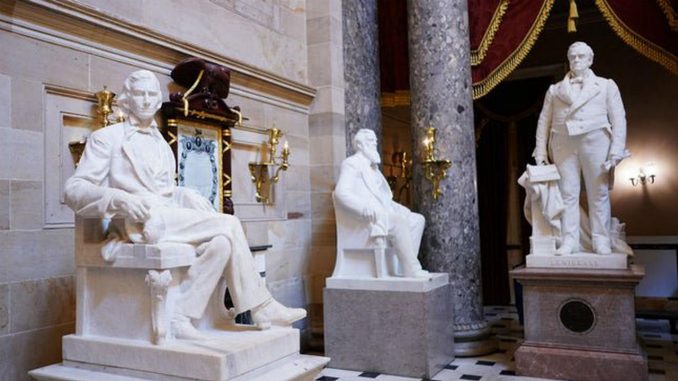
The House passed legislation on Tuesday that would remove artwork from the Capitol that honors people with legacies of defending slavery, including by serving the Confederacy.
The 285-120 vote was bipartisan, but it split Republicans. A minority of 67 Republicans joined with all Democrats in support, while 120 voted against it.
“We ought not to forget history. We must learn from history. But we ought not to honor that which defiled the principles for which we think we stand,” said House Majority Leader Steny Hoyer (D-Md.), the bill’s primary author. “It’s time to remove those symbols of slavery, segregation and sedition from these halls.”
The legislation would order the removal of more than half a dozen Confederate statues currently displayed in the Capitol as part of the National Statuary Hall Collection. Under the current rules for the collection, a statue can be removed only if the state government that contributed it gives the green light.
Those statues include figures such as Jefferson Davis, the president of the Confederacy; Alexander Hamilton Stephens, the Confederacy’s vice president; and Wade Hampton, a South Carolina planter who served as a Confederate military officer and went on to become a governor and a senator.
It would further replace a bust of former Supreme Court Chief Justice Roger Taney, the author of the 1857 Dred Scott ruling that Black people lacked the rights of citizens, with one of Thurgood Marshall, the first African American justice to serve on the high court.
Other statues depicting people with histories of defending white supremacy that are singled out in the legislation include Charles Aycock, who served as North Carolina governor; John C. Calhoun, the former vice president and member of Congress from South Carolina; and James Paul Clarke, a former senator and governor of Arkansas.
North Carolina and Arkansas are already in the process of replacing the Aycock and Clarke statues, but the current statues remain in the Capitol until the new ones are finished. Florida is similarly working to replace a statue of Edmund Kirby Smith, a Confederate general, with civil rights activist Mary McLeod Bethune.
A statue of Robert E. Lee, the Confederate army commander, was removed from the Capitol in December at the request of Virginia state leaders. It will be replaced with a statue of Barbara Johns, a civil rights activist who led a student walkout to protest school segregation.
Some Republicans argued the legislation unnecessarily undermined states’ authority, especially when some Southern states are already moving to replace the statues.
“This bill naming statues that are in the process of being replaced is nothing more than what I believe is an attempt by Democrats to prematurely thwart the authority of states in order to claim the moral high ground for themselves,” said Rep. Bruce Westerman (R-Ark.).
Republicans opposed to the bill also warned that removing the Confederate statues could lead to a slippery slope.
“Unfortunately, Democrats, animated by the Critical Race Theory concepts of structural racism, microaggressions, and a United States based solely on white supremacy, have chosen to remove statues that underscore the failures of our pre-1861 Constitution. Make no mistake, those who won the West and George Washington are next,” said Rep. Matt Rosendale (R-Mont.).
Rep. Marjorie Taylor Greene (R-Ga.), another conservative firebrand, called the legislation a “power grab.”
“All the tyrants throughout history tear down statues and attempt to erase history in order to reign with an iron fist,” Greene tweeted.
The House previously passed a version of the bill last year in response to nationwide protests advocating for racial justice that followed the death of George Floyd, who was murdered by a former Minneapolis police officer.
But that bill stalled in the Senate, as it was still controlled by Republicans at the time.
Democrats were nonetheless able to take some unilateral action to get rid of Confederate homages in the Capitol. Speaker Nancy Pelosi (D-Calif.) ordered the removal last year of four portraits of former House Speakers who served the Confederacy.
House Democrats are also advancing an annual spending bill for legislative branch programs that includes provisions mirroring the legislation passed on Wednesday to remove the controversial statues.
Members of the Congressional Black Caucus (CBC) have long called for taking down the Confederate statues in the Capitol, including after the violence at a white supremacist rally in Charlottesville, Va., in 2017.
Wednesday’s vote marked a victory for their efforts after spending years in the Capitol passing statues of people who fought to keep their ancestors enslaved.
“My ancestors built this building. Imagine how they would feel knowing that more than 100 years after slavery was abolished in this country, we still paid homage to the very people that betrayed this country in order to keep my ancestors enslaved,” said Rep. Karen Bass (D-Calif.), a former CBC chairwoman.
“Imagine how I feel and other African Americans and people of color feel walking through Statuary Hall and knowing that there are monuments to people who supported and embraced and fight for the break-up of our country,” she said.
Via The Hill
